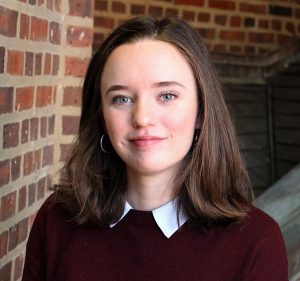This interview is part of a continued series introducing our graduate assistants to our online community. These are some of the people you will see when you visit our space, who will greet you with a smile and a willingness to help! Say hello to Abigail Sewall!
What is your background education and work experience?
Before coming to graduate school, I was working as an administrator in standardized testing for a few years. I am a fountain of useless knowledge on most national standardized tests such as the GRE, SAT, and LSAT. The aspect of my job that I liked the most was talking to people and guiding them through what was inevitably one of the most stressful days of their life. I feel like the unique customer service environment of that job oddly enough prepared me well for working at a reference desk, especially during those stressful times of the semester where people are in panic mode. Before I worked in standardized testing I received my undergraduate degree from the University of Colorado in Boulder in Spanish Literature and Political Science. I wrote my undergraduate honors thesis in comparative politics on trust in the police in Latin American countries. Through this process I had to learn to do large scale data analysis using a large public opinion survey database. It was a challenging project but I got a lot of help from the library.
What led you to your field?
My love of libraries developed as an undergraduate. I loved working on research projects because it gave me an opportunity to talk to one of the librarians, explore the collections, and discover the seemingly endless resources available in the library. The library really enriched my academic experience in such a profound way I wanted to be able to share that experience with others and help make the magic happen. Librarianship is a great intersection of my interests because it is both an intellectually challenging field and performs a valuable service to the community.
What are your research interests?
Where to begin? I am currently really interested in Twitter data literacy. I use Twitter every day and I find it to be a rich source of political and social discourse. I like to see how text data extracted from the popular micro blogging platform is used to address a variety of research questions. I’ve done some research on institutional archiving of Twitter data, which allowed me to consider some of the ethical and cultural implications of collecting and storing social media data. I am now working on learning how to scrape data from Twitter using Python. Experimenting with Python has been interesting because I don’t come from a technical background but I am finding I make slow but sure progress with it. I am excited to see where it takes me and I may even try building my own Twitter database.
What are your favorite projects you’ve worked on?
One of my favorite projects I’ve worked on as a Scholarly Commons GA was developing resources for using US Census data for students and researchers. In the process of making our LibGuide on the Census I learned a lot about the census questionnaire and how researchers use census data. It was also a lot of fun to help my supervisor with the US Census workshop because I love instruction and it was a great opportunity to show my expertise.
What are some of your favorite underutilized Scholarly Commons resources that you would recommend?
Our LibGuides! We have dozens of guides on a variety of subjects such as software tutorials, data discovery, digital humanities, and more. Each guide has been thoughtfully assembled by one of our librarians or GAs and contain links to resources, advice, and information to suit all of your research technology needs. I taught myself how to use SPSS using our SPSS tutorial LibGuide and would highly recommend it to anyone! Check out all of our guides on our webpage!
What is the one thing you would want people to know about your field?
I think it is important for people to recognize that libraries are always a reflection of the community they serve. All the services we offer at the Scholarly Commons address a specific need of the scholars and students at our university. We provide a space for collaborative work, software and technology available no where else on campus, and instruction to supplement the resources in our unit. I hope in my career that I will be able to continue to serve the needs of my community, whatever they may be.


